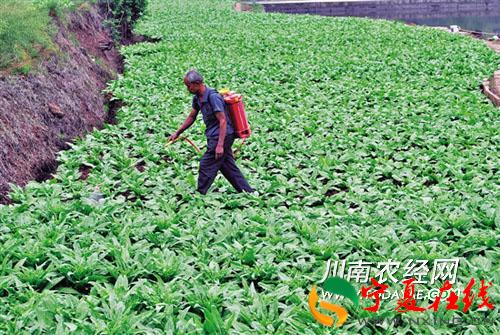Farmers in Jiaocheng return to their hometown to start businesses and take root in a new type of farming in mountain villages.
Here the mountains are continuous, and the springs in the valley are murmuring. Dozens of Loach ponds lie still in the valley, and a Loach of different sizes leaps out of the water from time to time, adding vitality to the silent mountain village. On May 23, at the 1997 ecological agriculture "Taiwan Loach" breeding base in Qianlu Village, Yangzhong Town, Jiaocheng District, several breeding technicians were cultivating more than 700,000 Loach seedlings sold to Gutian. "after three years of technical research, the Taiwan Loach cultivated by the base now has the conditions to supply a large area to the market." Huang Yufu, a returning entrepreneur, is overjoyed.
Speaking of his own entrepreneurial road, Huang Yufu sighed very much. In his 40s this year, he is a native of Jiaocheng. "when I was working in Shenzhen in 2012, I had a chance to come to the farm near the construction site to play under the leadership of a friend. When I heard that raising Loach could earn 20,000 to 30,000 yuan per mu, I was suddenly attracted. " Huang Yufu said.
"with such a good rural entrepreneurial idea, why don't I give it a try?" After careful consideration, Huang Yufu had the idea of starting his own business. Subsequently, he took the time to go to Guangdong, Jiangsu, Jiangxi and other places to start an on-the-spot investigation of the Loach breeding base. When he saw that many Loach breeding bases had done unboiled water, Huang Yufu could no longer contain his inner excitement.
After returning to his hometown, he began to choose a site, transfer land and dig ponds. Soon, more than 50 mu of land was transferred to Huang Yufu. He began to test the waters for local Loach farming. "the good mountain ecological environment and excellent water quality make Qianlu Village have unique breeding conditions, so that the Loach tastes delicious and tastes excellent." He said.
Dreams are far from reality. In 2013, seeing the painstaking Loach coming on the market, due to lack of technology, a sudden "water mildew" made Huang Yufu's one-year efforts come to naught. After this incident, Huang Yufu realized the importance of mastering technology. As a result, in 2014, Guangzhou Loach culture technology experts were specially hired to guide him, and he himself continued to learn breeding techniques through the Internet and books, and introduced a new variety of "Taiwan Loach".
Compared with the local traditional Loach, Taiwan Loach has the advantages of fast growth rate, low feed coefficient and strong disease resistance. The traditional Loach needs to be cultured for 2 years, while the Taiwan Loach, which has been crossed and selected for many years, can be put on the market in 4 months, and the breeding cycle is greatly shortened. " While telling us about his entrepreneurial experience, Huang Yufu introduced to us his Taiwanese Loach, which weighs more than 3 or 4 taels and is 16 to 20 centimeters long, and is four or five times the size of an ordinary Loach. In terms of meat quality and taste, it is also more delicious and nutritious than the local Loach.
After 4 years of exploration, the Loach culture base has ushered in a "bumper harvest" this year, which is expected to supply about 40 million Loach seedlings in Taiwan. Huang Yufu told reporters that the output benefit of Misgurnus anguillicaudatus culture in Taiwan is much better than the traditional farmland production project. Many farmers around the town have chosen to go to Guangdong, Jiangsu and other places to buy seedlings. With their Misgurnus anguillicaudatus seedlings on the market in an all-round way, it can be expected that this high-yield and high-quality seedling supply channel will drive the benefit-oriented cultivation of local villagers in the future. At present, they also take Loach culture as the core project, and then develop Mindong goat, colorful pheasant farming and blueberry and cherry cultivation, and explore the form of cooperatives to attract and mobilize more villagers to join the benefit-oriented agricultural production team.
- Prev

The old man grows vegetables in open field and grows them in rotation to get rich
The old man grows vegetables in open field and grows them in rotation to get rich
- Next

Yingshang County, Anhui Province: raising Loach in abandoned depression
Yingshang County, Anhui Province: raising Loach in abandoned depression
Related
- A course of planting techniques and methods on how to grow carrots
- How to plant the latest tulips?
- Is it better to pick tea in the morning or in the afternoon? When is the best time for tea to be picked? what is the third or fifth tea?
- Launch Yuanxiao Happy combination Haocha + Tea Yuan healthy Taste
- Penghu Tourism "Fireworks 20 Parade with You"
- 2022 West Lake Happiness holds "Digital Revitalization Voucher" and draws iphone13 and laptop.
- Banqiao Fuzhou social houses are designed to change start-up combined with police elimination to create a safe and livable environment
- The convenient measure of "mechanical weeding" in Xinbei has been abused and the Agriculture Bureau has imposed heavy penalties on the illegal land consolidation.
- Changgeng University Joins Hands with Four Memory Factories to Rescue Memory Talent Shortage
- The list of Taiwan's top 100 MVP managers is listed by the Director-General of the Farmers' Association of Sanxia District.

